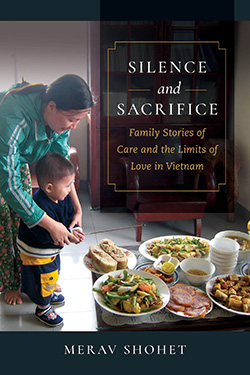Silence and Sacrifice: Family Stories of Care and the Limits of Love in Vietnam
Silence and Sacrifice: Family Stories of Care and the Limits of Love in Vietnam
Merav Shohet, Assistant Professor, Department of Anthropology, Boston University

Merav Shohet’s new book, Silence and Sacrifice: Family Stories of Care and the Limits of Love in Vietnam draws on over a decade of research based in central Vietnam to explore what happens across generations to families who survived colonialism, war, and massive political and economic upheaval. Placing personal sacrifice at the center of her story, Shohet recounts vivid experiences of conflict, love, and loss under Vietnam’s changing regimes. Illustrating the dynamics of micro and macro narrative interactions, she excavates how multiple generations narratively navigate conflicting commitments to those whom they are expected to love while affirming or contesting local versions of justice. Through these stories of troubled and troubling care, Silence and Sacrifice challenges the prevailing idea that sacrifice is merely a blood-filled religious ritual or patriotic act. Today, routine sacrifices—made largely by women—precariously knit kin together by silencing their suffering and reifying cross-cutting gender, age, class, and political hierarchies. Rethinking ordinary ethics, this intimate ethnography reveals how quotidian acts of sacrifice help family members forge a sense of continuity in the face of trauma and decades of turbulence and change.
“Silence and Sacrifice is that rare book that is both theoretically exciting and beautifully written. Telling unforgettable stories of Vietnamese families who have managed to maintain ties despite the legacy of war, Merav Shohet makes critical contributions to anthropological conversations about ethics, affect, continuity, and change. Silence and Sacrifice is a real achievement.”––Ayala Fader, author of Hidden Heretics: Jewish Doubt in the Digital Age
“The language of sacrifice (hy sinh) pervades the heroic symbolism of Vietnamese nationalism, but the state holds no monopoly on the legitimate use of sacrifice. Shohet’s moving family portraits show how everyday acts of sacrifice produce ethical and virtuous social persons and families disciplined by respect, care, and intergenerational love.”––Erik Harms, author of Luxury and Rubble: Civility and Dispossession in the New Saigon
“In this poignant, elegantly written book, Shohet illuminates how members of five extended families in central Vietnam fashion ethical lives in the midst of political turbulence and economic change. Shohet’s gift as a storyteller makes for a captivating read.”––Ann Marie Leshkowich, author of Essential Trade: Vietnamese Women in a Changing Marketplace
See UC Press for ordering information. 
Merav Shohet is Assistant Professor of Anthropology at Boston University. Her work integrates psychological-medical and linguistic anthropology to examine care, affect, ethics, and gender in relation to kinship, narrative, eating disorders, and the end of life in Vietnam and North America. She has published articles on these topics in American Anthropologist, American Ethnologist, Ethos, and the Journal of the Royal Anthropological Institute, among others. Two of her current projects include an SSRC-funded study of stigma syndemics and end-stage kidney disease in disenfranchised urban communities fighting Covid-19 and a longitudinal study of practices of elder-care and inequality in Israel’s transforming kibbutzim.
| Wednesday, April 21, 2021 Seminar via Zoom |
See CSEAS Current Calendar of Events and Activities
*B.Y.O. lunches welcome at all noon seminars
